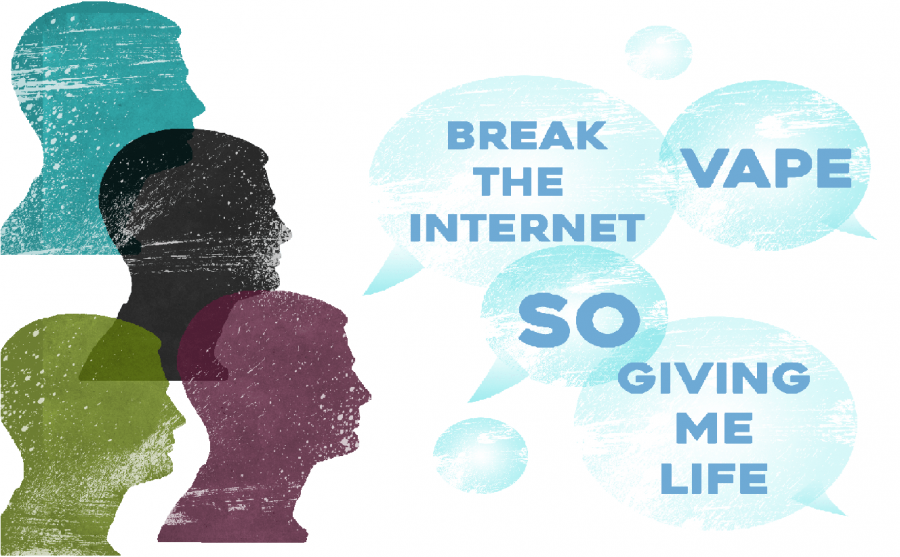Banned Words: Overused terms overlook cultural significance
January 28, 2016
After reading TIME’s 2015 banished words debacle (which included feminist, bae, basic and practically any other term from pop culture), I never wanted to read another banned words article again.
Unfortunately, I stumbled upon this year’s Lake Superior State University’s 41st Annual List of Banished Words and was sorely disappointed. While at its best, a banished words list makes fun of words that have fallen out of fashion, this current list and its predecessors continue to perpetuate troubling trends, banning phrases and terms most commonly used by people of color and young women.
More than half of the words on this list have been inspired or popularized through youth culture, including “break the internet,” “giving me life” and “problematic.”
Interestingly enough, the first word on this list is “so.” “So,” while formally used as a coordinating conjunction, can also function as a sentence opener in colloquial language.
But “so” has increasingly become associated with women who have “Valley girl” accents. For example: “Soooo, Rebecca, how was the party last night?” This one sentence paints the speaker and Rebecca as ditzy, capricious young girls who need some good sense smacked into them, right?
The inclusion of the word “so” on this list perfectly captures how women’s voices are often policed for a variety of phenomena, such as vocal fry and intonation.
Not to mention that a majority of this list is dedicated to excluding slang words from certain groups. As a result, it’s hard to ignore the fact that the list also seems to be targeting the language of people of color and young women.
White Americans frequently borrow from African American Vernacular English (AAVE), oftentimes being congratulated for their “trendiness” or “edginess.” Some AAVE slang is eventually even used by corporations and public figures for branding, promotion and sales. Hillary Clinton’s infamous “Just Chilling In Cedar Rapids” meme comes to mind.
After the public and corporations spread slang through communication and media, it quickly becomes overused. Ironically, white Americans and corporations are often the first ones to turn on the slang they themselves have popularized. The end result? Banned words list like these.
The whims of the majority then force minority communities to discontinue use of slang they originally created or risk being labeled “uneducated” and worse.
Minority communities are on the forefront of new linguistic innovation, and should continue to build upon this creative outlet.
Instead, white Americans, corporations and public figures should be more mindful of how they enjoy and partake in minority cultures.
Instead of trying to police the language of people of color and youth, they should let language do what it does best: change.
This piece was originally published in the pages of the Winged Post on Jan. 27, 2016


















![“[Building nerf blasters] became this outlet of creativity for me that hasn't been matched by anything else. The process [of] making a build complete to your desire is such a painstakingly difficult process, but I've had to learn from [the skills needed from] soldering to proper painting. There's so many different options for everything, if you think about it, it exists. The best part is [that] if it doesn't exist, you can build it yourself," Ishaan Parate said.](https://harkeraquila.com/wp-content/uploads/2022/08/DSC_8149-900x604.jpg)




![“When I came into high school, I was ready to be a follower. But DECA was a game changer for me. It helped me overcome my fear of public speaking, and it's played such a major role in who I've become today. To be able to successfully lead a chapter of 150 students, an officer team and be one of the upperclassmen I once really admired is something I'm [really] proud of,” Anvitha Tummala ('21) said.](https://harkeraquila.com/wp-content/uploads/2021/07/Screen-Shot-2021-07-25-at-9.50.05-AM-900x594.png)







![“I think getting up in the morning and having a sense of purpose [is exciting]. I think without a certain amount of drive, life is kind of obsolete and mundane, and I think having that every single day is what makes each day unique and kind of makes life exciting,” Neymika Jain (12) said.](https://harkeraquila.com/wp-content/uploads/2017/06/Screen-Shot-2017-06-03-at-4.54.16-PM.png)








![“My slogan is ‘slow feet, don’t eat, and I’m hungry.’ You need to run fast to get where you are–you aren't going to get those championships if you aren't fast,” Angel Cervantes (12) said. “I want to do well in school on my tests and in track and win championships for my team. I live by that, [and] I can do that anywhere: in the classroom or on the field.”](https://harkeraquila.com/wp-content/uploads/2018/06/DSC5146-900x601.jpg)
![“[Volleyball has] taught me how to fall correctly, and another thing it taught is that you don’t have to be the best at something to be good at it. If you just hit the ball in a smart way, then it still scores points and you’re good at it. You could be a background player and still make a much bigger impact on the team than you would think,” Anya Gert (’20) said.](https://harkeraquila.com/wp-content/uploads/2020/06/AnnaGert_JinTuan_HoHPhotoEdited-600x900.jpeg)

![“I'm not nearly there yet, but [my confidence has] definitely been getting better since I was pretty shy and timid coming into Harker my freshman year. I know that there's a lot of people that are really confident in what they do, and I really admire them. Everyone's so driven and that has really pushed me to kind of try to find my own place in high school and be more confident,” Alyssa Huang (’20) said.](https://harkeraquila.com/wp-content/uploads/2020/06/AlyssaHuang_EmilyChen_HoHPhoto-900x749.jpeg)







